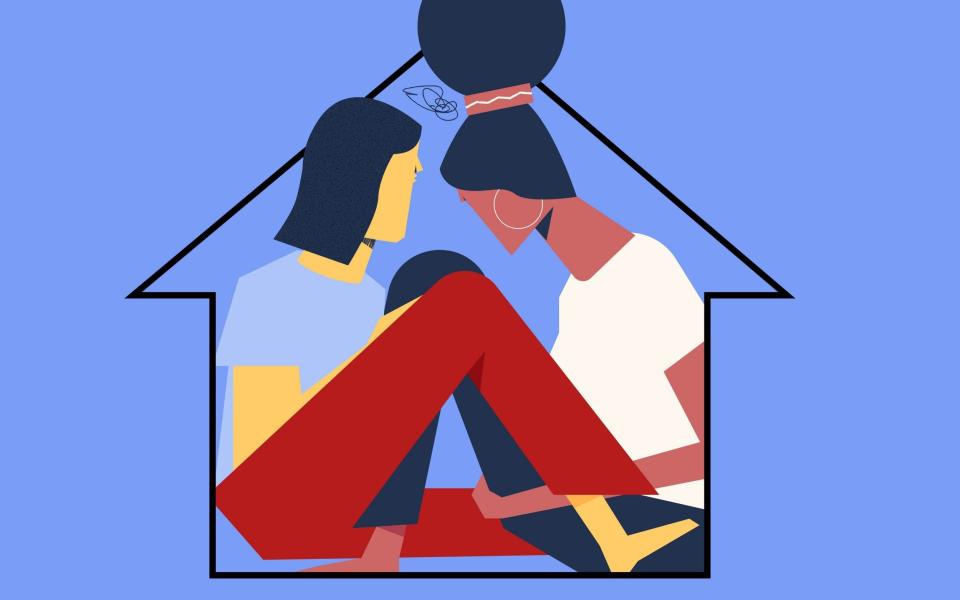Why the mortgage crisis will turn home offices into rooms for lodgers

The idea of taking in a lodger conjures up images of oddball tenants, run-down rooms – and perhaps even criminals who want to plan a robbery.
But despite the plot of TV series like Rising Damp and films such as The Ladykillers, in which a widow’s cul-de-sac home is used to plan a crime, Britain may be on the brink of a renaissance in room rentals.
Banks and building societies are predicting a surge in homeowners asking to take on a lodger to help pay soaring mortgage bills.
Executives predict that families who turned their spare rooms into home offices during the pandemic will decide to convert them into lodgings to cover rising costs.
Rocketing interest rates mean higher mortgage bills are threatening to wipe out the savings of 1.2million households, with monthly repayments by those affected set to soar by close to 50pc on average.
Ministers have told banks they must do more to help borrowers through the crisis after the Bank Rate hit 5pc this week, with the Chancellor summoning executives from Britain’s biggest lenders on Friday.
As families face the biggest mortgage shock in a generation, industry experts have said that they have seen an uptick in borrowers asking their banks for permission to take on a lodger.
Brokers have said they have seen a rise in interest around the Government’s Rent a Room Scheme, which lets homeowners earn up to £7,500 a year tax-free from.
An estimated 800,000 fixed-rate mortgages are set to expire in the next six months, along with 1.6 million next year. Meanwhile the average two-year fixed rate has reached 6.15pc, up from just 2.59pc two years ago.
A homeowner with the average outstanding mortgage debt of £127,000 could suffer a rise in their monthly costs from £589 to £856 – an increase of 45pc. This is based on a typical 25-year term.
Income from a lodger could entirely offset this cost without incurring any tax, and would in fact result in monthly profits of £231, assuming a rent of £625 per month.
Aaron Strutt, of broker Trinity Financial, said letting out a spare room would be the “logical step” for homeowners struggling to meet payments.
He added: “If you’ve got a spare room and your mortgage payments have gone up, it’s definitely an option.
“Which would you rather: To afford your mortgage and to live with someone else, or to have to downsize?”
It comes as around nine million bedrooms were “lost” as a result of the pandemic working from home boom, which saw owners convert spare bedrooms into offices, according to property data company Zoopla.
But now that trend could be reversed, as homeowners who stretched their budgets to buy bigger homes during the stamp duty holiday find they are struggling to pay their mortgages.
Mark Bogard, chief executive of Family Building Society, said: “Post-Covid, people were letting out a lot less spare rooms because they were using them as an office.
“What you may see now is a reversal of that. Instead of using the spare room as an office, they may now need to let it out.”
There are few restrictions on mortgage borrowers who want to house a lodger, according to UK Finance, the banking trade body. Most lenders allow a borrower to take on a lodger, provided they have obtained permission beforehand.
Now Read: Revealed: the most lucrative cities to rent out a room
Mr Bogard said in some cases high street lenders were allowing “not one, but two lodgers on the mortgage”.
He added: “Ultimately, lenders need borrowers to pay their mortgages. Provided you can get the paperwork right, it’s a really good solution.”
It’s a move that could help renters too. The average UK rent has now hit £1,126 a month, with rents in London rising over £2,000, according to property site Zoopla.
The Intergenerational Foundation think tank has called for the Rent a Room scheme’s tax-free threshold to rise to £10,000 a year – in line with inflation. It said that a 1pc increase in the use of the scheme would result in 160,000 new rooms becoming available for younger renters.
Research by the think tank found that homeowners typically enjoyed more space than those living in rented accommodation, and more than half of owners under-occupy their homes.
Angus Hanton, of the think tank, said: “Encouraging lodging helps younger generations by increasing supply, and therefore lowers rental costs more widely.
“Younger generations also usually pay lower rent as lodgers, pay less Council Tax council, and tend to have access to more living space.”
Data from the lodger website SpareRoom shows the volume of live-in landlords fell drastically throughout the pandemic but has steadily crept up since the new year. There were 9,534 lodger adverts in May this year, compared to 4,794 in 2020 – an increase of 98pc.
Rosanna Bryant, head of financial services regulation at law firm Addleshaw Goddard, said there is normally a contractual restriction on borrower’s mortgages that does not allow them to take on a lodger. But upon request, a lender can lift this restriction.
She said: “It doesn’t surprise me that lenders are easing their restrictions on this. It seems like a logical solution if a borrower cannot afford their mortgage repayments anymore.”
Lenders tend to restrict homeowners taking in lodgers because it can present an added risk to the care of the property, she said.
Borrowers can also ask their bank to extend the term of the mortgage to lower monthly costs, pay interest-only for a short while, or even take a break from payments.
Last month, Airbnb launched an ad campaign targeting homeowners with spare rooms. While renting out one room was always possible on the platform, the feature went largely underused, the company said.
However, Brian Chesky, the company’s chief executive, said renting an individual room was “often more affordable than hotels”.

 Yahoo Finance
Yahoo Finance 